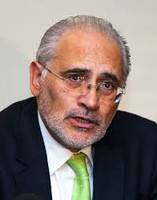
Further collaboration came from other European neofascists, most notoriously Spanish Ernesto Milá Rodríguez (accused of the 1980 Paris synagogue bombing). He was backed by former SS officer and Nazi German war criminal Klaus Barbie and Italian neofascist Stefano Delle Chiaie.

He immediately outlawed all political parties, exiled opposition leaders, repressed trade unions and muzzled the press. Of rightwing ultra-conservative anti-communist persuasion, García Meza endeavored to bring a Pinochet-style dictatorship that was intended to last 20 years. Allegedly, the Argentine Army unit Batallón de Inteligencia 601 participated in the coup. When portions of the citizenry resisted, as they had done in the failed putsch of November 1979, it resulted in dozens of deaths. Within months, the Junta of Commanders headed by García Meza forced a violent coup d'état, sometimes referred to as the Cocaine Coup, of 17 July 1980, when several Bolivian intellectuals such as Marcelo Quiroga Santa Cruz were killed.
DESCARGAR HISTORIA DE BOLIVIA DE CARLOS MESA PDF EDITOR INSTALL
This group pressured President Lidia Gueiler (his cousin) to install General García Meza as Commander of the Army. In this manner, the narcotraffickers were in essence purchasing for themselves the upcoming Bolivian government. Many allegedly had ties to cocaine traffickers and made sure portions of the military acted as their enforcers/protectors in exchange for extensive bribes, which in turn were used to fund the upcoming coup. Moreover, they tended to regard the decline in popularity of the Carter administration in the United States as an indicator that soon a Republican administration would replace it-one more amenable to the kind of pro-US, more hardline anti-communist dictatorship they wanted to reinstall in Bolivia.


Many of the officers involved had been part of the Hugo Banzer dictatorship and disliked the investigation of economic and human right abuses by the new Bolivian congress. He became leader of the right-wing faction of the military of Bolivia most disenchanted with the return to civilian rule. He then rose to division commander in the late 1970s. García Meza graduated from the military academy in 1952, and served as its commander from 1963 to 1964.


 0 kommentar(er)
0 kommentar(er)
